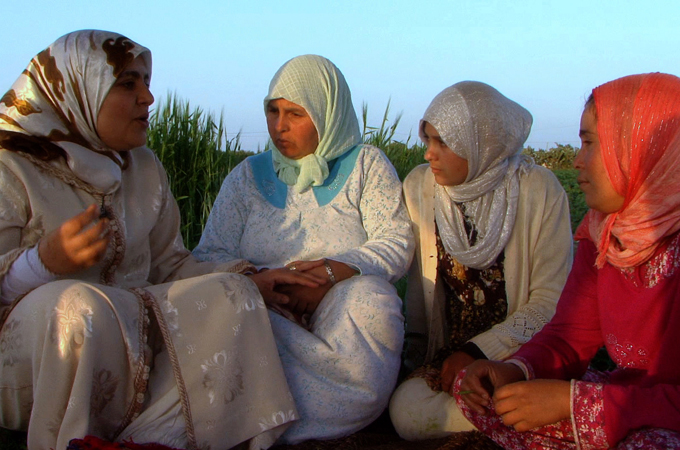
Casablanca Calling
An exploration of women and Islam in Morocco through the story of three female Morchidat or spiritual guides.
Editor’s note: The full version of this film is no longer available online.
Casablanca Calling is an intimate portrait of three Morchidat, female religious preachers, based in Morocco.
Keep reading
list of 4 itemsInside the pressures facing Quebec’s billion-dollar maple syrup industry
‘Accepted in both [worlds]’: Indonesia’s Chinese Muslims prepare for Eid
Photos: Mexico, US, Canada mesmerised by rare total solar eclipse
Their stories illustrate a society in transition and a mission to educate a nation, and they preach the virtues of tolerance, compassion and equality.
Karima is young and outgoing; in the capital Rabat, she relishes working with young people. Bouchra is a powerhouse of energy working in Larache in the north, where she is determined to change the culture of misogyny and champion girls’ education. Hannane is warm and compassionate, working to explain the true teachings of Islam and expose superstition, misinterpretation and blind adherence to tradition.
In this film, we follow these three Morchidat as they work in mosques, schools and prisons around the country.
FILMMAKER’S VIEW
By Rosa Rogers
We first heard about the Morchidat through a Chinese newspaper which announced the start of a new programme in Morocco to train women as religious leaders. They were to work alongside male imams in mosques but also to have a wider role in society, working in schools, orphanages, prisons, hospitals and other public institutions.
 |
| The Morchidat aim to highlight Islamic teachings of compassion, tolerance and equality [Al Jazeera] |
Only a year before, Casablanca had been devastated by an unforeseen terrorist attack which claimed many lives. The article said this new generation of religious leaders were setting out to bring a deeper understanding of Islam to the wider population, and especially to women.
We approached the Moroccan embassy in the UK and told them we were interested in making a documentary about the Morchidat and almost a year later we were invited to meet the Ministry of Islamic Affairs in Rabat, together with a Moroccan producer, Merieme Addou. As a Muslim woman she felt that what the Morchidat were doing was ground-breaking and she became associate producer on the film.
There were many suspicions. There had been a lot of international news coverage about the Morchidat and the ministry felt much of it had been misrepresentative. They wanted to know what our intentions were and what we wanted to say about Islam. They agreed to us going ahead in principle, but we were later to discover that filming a long-term observational documentary was going to be difficult, and that each trip would present a new set of struggles to regain permissions.
We went to a mosque where a Morchidat was working and were overwhelmed by the number of women present and how passionate they were about the work of the Morchidat. They all told us that before this, they had had nobody to talk to about how to resolve problems in their lives, no one to explain their religion to them, no support in everyday spiritual life. Their overwhelming enthusiasm convinced us this was a story worth telling.
|
How, within an Islamic framework, can women rise up and achieve their full potential? And how can ideas and attitudes that have been entrenched for generations be overturned? |
We met Bouchra and Karima while they were in the final stages of training and they told us with conviction and passion about the problems in their country and how they wanted to change them. Girls not getting educated, being married too early, young people wanting to emigrate to the West, people not helping each other in times of need. We knew we had found two of our characters. And we met Hannane soon after.
Filming Casablanca Calling was the most challenging experience of my filming career. The endlessly changing permits needed for every place we filmed in and the cultural suspicion of cameras meant that for every day we were able to film, there were five or six days which came to an abrupt halt. We had hoped to get all filming done within a 10 month span – it ended up being closer to two-and-a-half years.
Despite the difficulties, we passionately believed that the work of the Morchidat was ground-breaking and that their story must be told.
There is widespread misrepresentation of Islam in much of Western mainstream media and we wanted to show a different side – by telling human stories which transcend cultural divides, whilst simultaneously illuminating everyday truths about the lives of ordinary women in the Arab world.
Amidst all the upheaval and changes across the Arab world the role of the Morchidat in Morocco seems even more important. How, within an Islamic framework, can women rise up and achieve their full potential? And how can ideas and attitudes that have been entrenched for generations be overturned?
To find out more about the Morchidat of Morocco, and the characters featured in the film, please visit the website: Casablanca Calling.